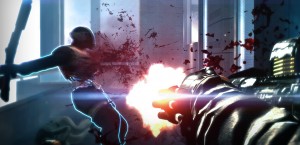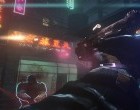Syndicate: Where the corporation is now...
Language »
Ask for a game trying to do too much, and I'll show you Syndicate. Ambition is to be admired, but EA falls so short of the mark that even an A for effort would be kind. But when trying to please an expectant fan base from the original, as well as trying to engage newcomers, this was always going to be a difficult task.
The original Syndicate was released in 1993 by Bullfrog, which unfortunately passed me by. You'll recognise its later features like Dungeon Keeper and Theme Park, but this was the much darker forerunner. It was a massive hit for its imaginative cyberpunk storyline; countries and nations have crumbled leaving only powerful mega-corporations called Syndicates. Starbreeze's re-imagined game is set in the same dystopic world, where 15 billion people willingly have chips inserted directly into their brains by the Syndicate they are born into. You are one of the chosen few. An agent to protect and serve the interests of your Syndicate, Eurocorp.

That is where the similarities end though; the original was an intricate tactical shooter, while Starbreeze has gone for a straight first person shooter. Controls are very similar to most other FPS, but the interface is new and shiny. It styles itself on the data chip in your head which interacts intuitively with everything around you. Ammo counters are directly next to your gun, and the dart relay takes the slow motion or focus abilities to an interesting place, allowing you to dish out more damage whilst taking much more. Unfortunately you can only use this ability for around 10 seconds at a go, which is absolutely not long enough.
The attention to detail goes throughout every layer of the game. Missions are literally 'hostile takeovers', debriefs are performance audits and your aim is to achieve a CEO game ranking. And the use of the dart chip makes for an interesting dynamic to ordinary shooters. You are able to use your chip to hack into surrounding equipment and even enemies to make them do your bidding. You have three main applications at your disposal to use in battles at your discretion; Suicide, Backfire and Persuade. They're fun additions and interesting at first, but with so much going on you'll probably just use one – and that's only when you remember they're there.
The storyline is intriguing at first, drawing you into this new and disturbing world. When Brian Cox turns up as the voice of your boss, you know he's going to be evil. There's a lot of trust in the early stages that eventually it will all get explained and everything will make sense. I wouldn't hold your breath though. A lot of the gaps may or may not have been filled in with the inglorious infobank screen – collectible stories and descriptions of weapons, locations and a number of character backgrounds – but again the writing was so small I gave up reading whatever was written there. It's as if the game was played under a microscope.

Very often you're expected to do three different tasks at once; hacking enemy equipment, shooting at enemies and attempting to control your dart relay. Your link to the environment initially appear limitless, but very soon you learn you only have the opportunity to hack what the developers tell you to. The game is very linear and bizarrely paced. Honestly, there were a couple of levels that could quite easily have been cutscenes. However, the rare occasions that offer you some freedom, you can have some fun; hacking into a lift and cutting an enemy in two with it's doors is a sadistically satisfying highlight.
While on the subject of gore, Starbreeze has certainly gone to great pains for detail. So much so that it's gone to the trouble of making blood spill and seep out from recently dispatched enemies. The game certainly deserves its 18 rating. But the violence is a distraction from the disappointment of everything else. It's as if the developer was so focussed on the blood detail that it forgot to actually make the game.
By halfway through the shininess will have faded and you'll begin to lose interest. Boss battles follow very familiar protocols and you'll find it very hard to care about any of the characters. You'll be counting down the pointless gunfights to the end of the game, whilst the prospect of a second play through would make you consider using the suicide application yourself.
On finally reaching the end, if you worked out what on Earth the last twenty 'milestones' were about then you're a better person than me. That's if you've even engaged your brain at all from all the mindless shooting at enemy after enemy. The original game was made in 1993 and this felt like a shooter that belongs with Doom for its single-minded violence.

On top of that you're given a separate co-operative game mode, which makes about as much sense as the main story. They're set up with a series of flimsy back stories with differing objectives, though none venture further from the basic concept of shooting anything that moves. And as appealing as it may be, that doesn't include yourself.
Here is a game that is trying to be too clever. By concentrating on new interfaces, an intricate backstory and vastly different gameplay, it manages to fail spectacularly on all three counts. I honestly couldn't sum up the storyline in less than a minute, and even then I'd get confused. A lot. Gameplay turned into a boring string of shoot-outs in barely different landscapes and I don't think I could care less about anything any character said or did during the course of the story. I'm sure Starbreeze thought they were onto a winner here, but for me this was a view of the future, but a step back in time.










